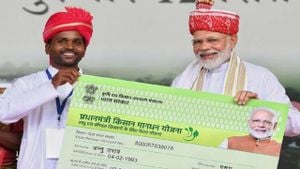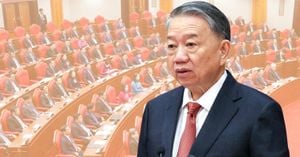The 2025 German federal election results are making waves across the country as the political atmosphere shifts significantly. The election, held on February 23, has seen over four million voters flock to the polls across 22 constituencies in Hessen, marking one of the most anticipated electoral events since the dissolution of the Ampel coalition government.
The Christian Democratic Union (CDU) emerged as the leading party, garnering approximately 29% of the overall vote. This marks a notable improvement from previous elections, as the CDU continues to regain its foothold as one of the dominant forces within German politics. The Social Democratic Party (SPD), typically seen as the CDU’s primary competitor, followed with about 18.5%, overshadowed by the Alternative für Deutschland (AfD), which nearly matched them at 17.8%.
Interestingly, the election results have not only showcased voter preferences but also highlighted significant discontent with the previous ruling coalition. Thorsten Stolz from the SPD remarked, "Die Ampel ist ganz klar abgestraft worden für die Arbeit der zurückliegenden drei Jahre," encapsulating the disappointment felt within the party about their losses. The SPD was only able to retain two direct mandates, reflecting broader disfavor toward the party among the electorate.
Voter turnout was exceptionally high, at 84%, which is the highest since 1990. This increased participation indicates the electorate’s heightened engagement, possibly spurred by the urgency of the political climate and the recent upheavals within the government. The young voters particularly noticed; reports suggest they turned out significantly, adding to this encouraging rate.
On the other end of the spectrum, the CDU is taking stock of its triumph, yet the party’s leaders express mixed feelings. Patricia Lips, CDU’s Spitzenkandidatin, stated, “Das Ergebnis ist einfach erschreckend,” indicating the party’s recognition of the polarized nature of this election, with many younger voters leaning toward the left. The Greens also saw their share of the vote increase slightly to around 12.5%, affirming their position as relevant contenders within the political arena.
Die Linke has also made strides, achieving almost 9% of the votes, which signifies some consolidation of their base—the party remains significant as many voters seek alternative options outside the mainstream parties. The Left's success, combined with marked support for the AfD, whose numbers have surged by over 10% since the last election, paints a complex picture of current political sentiment. Tarek Al-Wazir (Grüne) commented, "Dafür, dass wir aus der unbeliebtesten Bundesregierung seit Jahrzehnten kommen, ist es ein gutes Ergebnis," acknowledging the difficult circumstances for his party yet expressing hope moving forward.
The new electoral laws have significantly influenced these results. The restructuring has implemented stark changes on how direct mandates translate to representation, meaning even if candidates win electoral districts, they may not secure seats if their party receives insufficient secondary votes. This innovation has posed challenges, with some candidates, including Jakob Blankenburg from the SPD, cautiously celebrating his luck at clinching the direct mandate but also recognizing the uncertainty tied to being assured representation.
Overall, as the dust settles on the 2025 election, the significant movements within the voting patterns are indicative of shifting allegiances and growing polarization among the German electorate. The CDU and AfD's respective rises suggest not only changing political dynamics but also foreshadow possible coalition arrangements as the parties navigate the post-election environment. This election serves as not only evidence of voter compensation with governmental performance but also as groundwork for new discussions surrounding future policies and party strategies.
Looking forward, the stage is set for what the future holds for German politics post-2025. With the Bundestag now reflecting these changes, discussions around possible coalitions and governance strategies will undoubtedly dominate the political discourse leading up to the new government formation.



